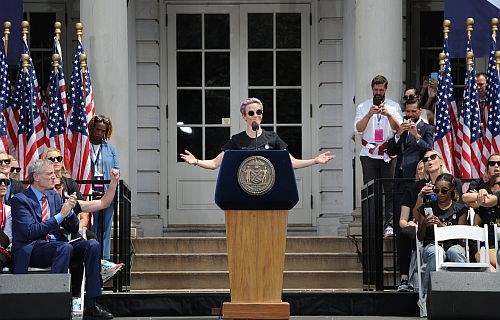Comment
Will the rise of athletes’ power lead to the fall of empires?

Megan Rapinoe deliverede a powerful speech at the New York City Hall after the U.S. women's national soccer team won the 2019 World Cup, adressing equal rights and diversity of identity. Photo: Sam Simmonds/Polaris/Ritzau Scanpix
09.10.2019
The governing bodies of sport have never been challenged by top athletes as they are today. But solutions are complex, and that is why a wide range of stakeholders will discuss them during Play the Game 2019.
”Yes, we play sports. Yes, we play soccer. Yes, we’re female athletes, but we’re so much more than that. You’re so much more than that. You’re more than a fan. You’re more than someone who just supports sport. […]. You interact with your community every single day. How do you make your community better?”
There is probably no speech given by any active athlete that has embraced the multiple dimensions of athlete activism as the one the co-captain of the U.S. women's national soccer team, Megan Rapinoe, gave a few days after winning the 2019 FIFA World Cup in front of the New York City Hall. It contained references to all key issues on the palette of athlete activism: The fight for better pay and working conditions. The fight for diversity and against discrimination. The fight for influence in the decision-making bodies of sport.
And last, but not least, the fight for creating better communities, even a better world, through sport.
Even if Rapinoe’s speech stands out as particularly impressive, it also reflects a trend that has grown over the past few years: Elite athletes are increasingly speaking up to improve their situation or to improve society.
Some athletes target social injustice, such as Colin Kaepernick, who peacefully decided to kneel, when the U.S. national anthem was sung and the Stars and Stripes raised, in protest against racism and police violence.
Others demand protection from a harmful sporting environment, such as the brave female gymnasts, who revealed horrendous sexual abuse from their national team doctor accompanied by oppression by the sports leaders that were responsible for protecting their athletes.
And disappointment with the International Olympic Committee’s (IOC) handling of the Russian-international doping scandal – which not only included state-sponsored doping by the Russian state, but also a prominent group of athletic leaders cheating and blackmailing the athletes – has triggered a variety of athletes worldwide to speak up and seek other platforms and other groupings than the so-called Olympic family.
Freedom of expression and freedom of association
Curiously enough, neither society nor the governing bodies of sports seem overly enthusiastic about the way athletes energise the sports debate. Democratically elected governments, who would usually call for civic engagement, seem to prefer athletes that move only those muscles that do not affect the tongue.
The international sports federations, who base their legitimacy on membership of millions of athletes with a right to vote, seem disturbed when some of their prominent members speak up and claim their democratic rights.
Even the IOC, who always claims to put athletes first, asks of its athletes to swear an oath of unlimited loyalty to the institution, and has so far reacted negatively when athlete groups outside the IOC’s own ranks have raised their voices or dared to form their own, independent associations.
It is hard to understand why democratic structures would like to silence their constituency. Are the power brokers in sport afraid that the voices of athletes will bring empires to fall?
Some would like to dismiss the new trend as a movement by privileged, well-paid athletes who just want a bigger slice of the cake. Such athletes probably exist, but most professional and semi-professional athletes are not particularly well-paid, and they often try to make a living in a sporting environment that defines its own laws and regulations, caught up in legal grey zones or sometimes in an outright criminal environment. It is hard to blame them for organising in unions and other interest groups.
But there is more to the trend than a natural call for labour rights in a growing global industry. Two fundamental human rights, essential components of democracy, are at stake: Freedom of expression and freedom of association.
For Play the Game, these rights have always had centre stage, and we appreciate the opportunity to gather some of the most important athlete groups and other stakeholders to discuss how we shape the future for athletes.
Because the call for rising athlete power also raises difficult questions:
- What is a genuine athlete representative?
- How do athletes best organise?
- How many unions should a federation negotiate with?
- Who will speak for the millions of amateur athletes in organised sport?
- Who defends the interests of the millions of citizens who practice sport outside the associations, in the gyms, on the streets, in the woods?
- Will professionalisation and unionisation put an end to sport as a civil society factor?
We look forward to discussing these and many more central questions in a joint search for solutions that, at the end of the day, can only advance athlete power in a sustainable way if we share the spirit that Megan Rapinoe expressed:
“Do what you can. Do what you have to do. Step outside of yourself. Be more. Be better. Be bigger than you’ve ever been before.”
Ahtlete power, abuse and rights will be up for debate at Play the Game 2019.
You can see the full programme, the list of speakers and all other information you need about the conference at the conference website.
Play the Game 2019 would not be possible without the generous support from the University of Colorado, Colorado Springs, and a great number of sponsors in Colorado Springs and Denmark. You can see the list of sponsors here.






